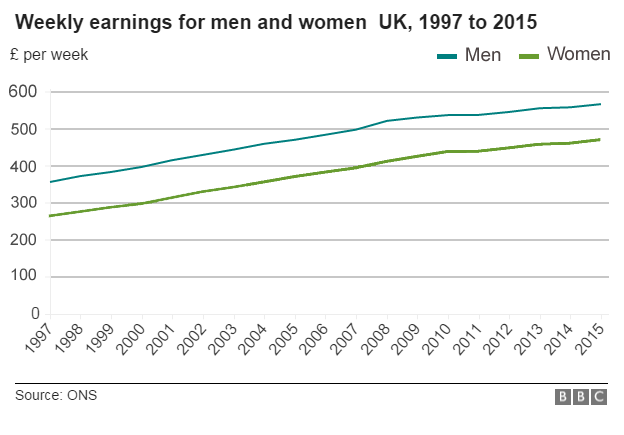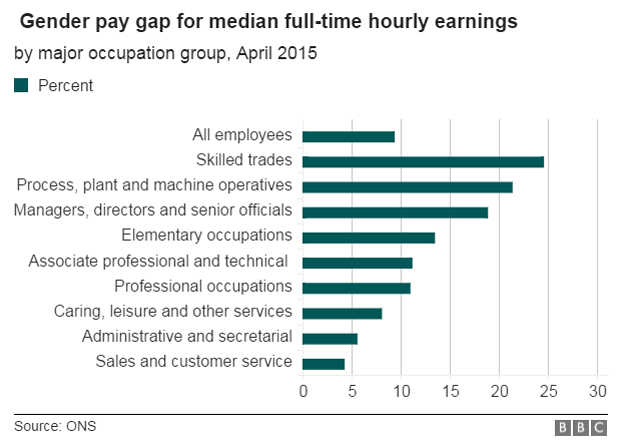Gender pay gap almost unchanged, says ONS
- Published

The gender pay gap has changed "relatively little" over the past four years, the Office for National Statistics (ONS) has said.
The gap between men and women's pay for full-time workers was 9.4% in April 2015, compared with 9.6% in 2014.
While that was the narrowest difference since the figures were first published in 1997, there has been little change overall.
Since then the pay gap has remained at around £100 a week, the ONS said.
According to its Annual Survey of Hours and Earnings, external (ASHE), men working full-time earn an average of £567 a week, while women earn £471.

The TUC said that, at the current rate, it could be 50 years before men and women have pay parity.
"Progress on closing the full-time gender pay gap has slowed dramatically over the last few years," said TUC general secretary Frances O'Grady.
"If it continues to fall at this pace, we're looking at nearly half a century before we have pay parity between women and men."
However, among part-time workers, women earn more than men.
In fact this "negative" pay gap widened in April 2015 to 6.5%, from 5.5% in 2014.
The pay gap also varies by occupation.
Men working in skilled trades have the largest pay premium, at 24.6%. However the gap in sales jobs is the lowest, at 4.3%. See chart below.

New legislation going before parliament will soon require companies to publish details of male and female pay.
Firms that employ more than 250 people in England, Scotland and Wales will be obliged to show average wage rates for both sexes.
The government hopes the measure will reduce the pay gap.
Wage increases
The ONS figures also show that average weekly pay for full-time employees was £528 in April 2015, up by 1.8% from the previous year.
After inflation is taken into account, earnings were up by 1.9%, the first real terms increase since 2008.
That was helped by the fact that the Consumer Prices Index fell by 0.1% in the year to April, while wages rose.
On an annual basis, the median amount that full-time workers earned before tax was £27,600.

What are average earnings in your area?

Click on this link , externalto find out

The Resolution Foundation, a think tank that aims to improve living standards, said pay growth had been stronger for lower paid workers, and weaker for those paid higher wages.
It welcomed the return of real terms earning growth, but it said that wages were still 8.9% below their peak in 2008, after taking inflation into account.
It said it will take another six years for pay to return to that level.
And it pointed out that while pay has rebounded strongly in Northern Ireland and the West Midlands, real pay has fallen in London, the East Midlands and Wales.
- Published25 October 2015

- Published9 November 2015
